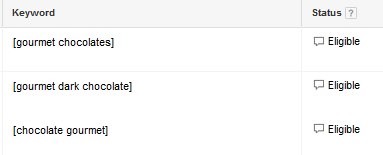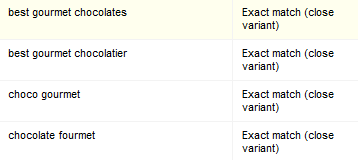The world of PPC is ever-changing, and the newest rules make it that much harder to be an effective advertiser. In this post, we will go over three ways to combat the new laws of close variants that are taking over PPC keywords.
Background
Google and Bing have allowed the use of close variants since early 2014. In August, Google announced they would be rolling out variants as mandatory across all accounts in September, stating:
Example: [Women’s Hats] would show for the exact term, plus a few variants like woman’s hats, womens hats, and maybe a misspelling or two.


Since the launch, the variants have been much more liberal in their matching. I have seen new phrases being formed and words added like “for”, “to”, “best”, along with other intent-changed variations.
So I went to Twitter to ask other professionals and much to my surprise, I wasn’t the only one experiencing more than ‘variants’ in drastic ways, completely outside Google’s own parameters.
Anyone else noticing the negative affect of ‘close synonyms and misspellings’ with exact match now that its mandatory? #ppcchat @adwords
— Michael Knight (@MichaelAKnight) November 13, 2014
@MichaelAKnight @adwords Yes. I recently had a 2-word keyword match to “c.” Yes, to a single letter search. #fail #ppcchat
— Melissa Mackey (@Mel66)
@MichaelAKnight @Mel66 Did you know that “Firefly” and “Dragonfly” are closely related? At least it’s not a single letter.
— Christi Olson (@ChristiJOlson)
@MichaelAKnight Yep! E.g., the exact KW “x x city name” triggers the ad for other cities too where the advertiser has no biz. @adwords
— Sakis Rizos (@bizwriter)
Needless to say, search terms reports everywhere are seeing issues with how Google’s algorithms are handling the term ‘close variants’.
Three Tactics to Improve Performance
So, as we dive into the details of how to combat the new laws of close variants, here are a three main tactics advertisers can use to stand up to a variant driven world.
- The Search Terms report is your friend more now than ever.
- Add more negatives in our exact match and phrase match keywords.
- It is even more important to separate exact and phrase match from broad match keywords.
In this next section, we will discuss these focus areas more in-depth to help drive a successful campaign strategy.
Keep a Close Eye on the Search Terms Report
This is crucial now that Google and Bing will match your keywords to relevant or irrelevant searches. Once you have located additional variations from the Search Terms report, there will be three options: Leave it alone, add it as a keyword, or add it as a negative keyword.
For this portion, let’s discuss adding in keywords from the Search Terms report. With the exact match terms report growing, I still recommend adding in exact match variations as new exact keywords when they have good performance, as this will allow for lower CPCs when the keyword is matched as an exact term.
If the keyword has little to no performance in the report, it is ok to leave it until there is enough data to make an educated decision around adding it to your keyword list or making it a negative.
Exact Match Keywords Now Require Negatives
According to the blog from Google, the original reason for variants was not to change the keyword’s intent or add in new words, as this completely negates the use of match types, but to just allow for very close matching. Since this is not the case, and Google most likely won’t change this policy any time soon, negatives are that much more important.

Now shows for:

And 40 more ‘close’ variants.
Now, negatives are an important factor in keeping your exact matches as closely relevant as possible and cutting out any under-performing misspellings or “close” variants like [gourmet chocolates] matching to [best gourmet chocolatier]. If your keyword is an exact match for [gourmet chocolates] and the close variant “best gourmet chocolatier” shows in the report, make sure to add this as an ad group or campaign level negative, depending on the keyword themes.
As advertisers, we have to think of exact and phrase match more like broad or modified broad keywords instead of what their match type names used to imply.
Separate Broad, Phrase, and Exact Keywords
In regards to overall strategy, I have been implementing this for over a year and a half in the accounts I run (before the new variants rule went into effect). But since close variants became the rule, this strategy has been a life-saver.
The strategy is to keep keyword match types separate for multiple reasons, including negatives, new keywords, testing, and higher performance. For the sake of close variants, keeping keywords separate will allow for a cleaner and more usable search terms report, making it simple to add in negatives and new keywords.
Conclusion
By following these three guidelines, your AdWords and Bing campaigns will have a much better chance of improved performance and allow for the most strategic advantage over these new variations Google and Bing are describing as “close”. Maybe in time, the algorithm will be refined and advertisers can find common ground with the powers-at-be, but for now, advertisers must find new ways to combat the new laws of close variants.
Featured Image: Andrew via Flickr (Creative Commons)


